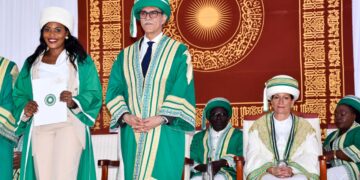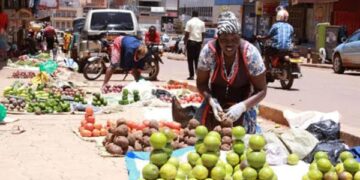By Pennina Nakigozi,
NATIONAL
The FDC Deputy Secretary General, Harold Kaijja has tasked the government to remove tax that was imposed on imported textile
“We are concerned about the unfair returned tax of 3.5 US Dollars put on textile,we condemn this because it will make clothes more expensive, esp for the ordinary people,” he said
Earlier today, Kaijja was speaking to journalists during the FDC press briefing at the party’s headquarters in Najjanankumbi on Entebbe Road.
In his remarks, he expressed grievances as on how government is treating traders dealing in textile products by over taxing them than the textile manufacturing companies.
It should be recalled that in the budget for the financial year 2021/2022, the minister of finance Matia Kasaija introduced an import duty of 3.5 dollars per kilogram of cloth or 35 percent of the value of the item, whichever is higher.
The tax was however removed after traders decried the high cost of doing business due to the tax prompting government to hault it immediately.
Also, on the reading of the budget for the financial year 2022/2023, the minister of finance Hon. Matia Kasaija announced that there will be no new taxes in the budget of this financial year.
However, this has been disapproved by the traders majorly those dealers in imported textile who argue that while clearing for their cargoes at URA offices in Nakawa, they are being charged USD3.5 (35% tax) per kilogram of cloth contrary to the minister’s statement at the reading of the budget.
The government has for many times argued that it aims at strengthening the country’s economic potential by empowering the local industries for example through the strategy of Buy Uganda Build Uganda (BUBU). Therefore, the increment on the import tax is to frustrate the textile traders from importing these textiles but rather buy them from the local textile factories.
However, Kaijja is displeased with the government for siphoning poor Ugandans who have been affected by the hard economy as the result of the COVID-19 pandemic suggesting that government should empower local people with small-scale textile cottages like traders in kikuubo, Kiyembe, individual homes, by revisiting and stooping this tax.
Issa Ssekito, the spokesperson Kampala City Traders Association (KASITA) had earlier said in an interview with Global Press Journal said that boosting the local manufacturing companies is not a bad idea but noted that it shouldn’t come at the expense of import traders.
He advised that the government should invest in the country’s strong economy areas such as agriculture which according to the government’s data employs 68% of the country’s population.

Be as it may, Kaijja advises government to use standard measurements that other countries use while taxing textile products.
“We do not know any other country where textile is measured in kilograms. Textile is measured in quality and meters not kilograms. The regime should empower local people,not the pinnets.” Kaijja explained
He warns that measuring and taxing textlie in kilos will affect the prices of second-hand fabrics since they might weigh heavily hence an increment in their prices yet their quality is less than the first-hand fabrics.







































